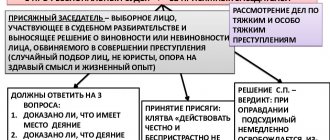Jury trials in Russia: past, present and future
A little history
The jury trial in Russia appeared as a result of the judicial reform of 1864. “The idea was that questions of fact, that is, whether this or that event happened or not, would be decided by the jury, and questions of law, that is, the qualifications of the act, would be decided by the judge,” says Roman Nefedov from the Law Bureau “Q&A” Law Bureau “ Q&A" Regional rating. group Family and inheritance law group Criminal law group Arbitration proceedings (major disputes - high market) Company profile. This approach eliminated the bias of the judge, who was now bound by the jury's verdict.
With the advent of Soviet power, this model of justice was abolished. The reasons for this were political, Nefedov is sure. The transition to a new system, which also took place by force, required controlled legal proceedings.
6 and 8
– this is how many jurors are needed to try a case in the district and regional courts, respectively.
Formally, they returned to jury trials at the end of the USSR. In 1989, the Supreme Council reserved the right to such a trial for defendants facing the death penalty or imprisonment for a term exceeding ten years. But in reality, the jury resumed its work later - after the collapse of the USSR. In 1993, as an experiment, it appeared in five regions: Ivanovo, Moscow, Ryazan, Saratov regions and Stavropol Territory. And already in 2004, juries began working in all regions, with the exception of Chechnya - there this happened only in 2010.
Initially, the panels met only in regional courts and consisted of 12 people. But in June 2021, amendments came into force that reduced the number of jurors in regional courts to eight people, and also extended this institution to district courts. The latter were given the right to consider cases with the participation of only six assessors.
How does the “people’s” court work now?
At the moment, the jury has jurisdiction over several dozen crimes listed in paragraphs 2 and 2.1 of Part 2 of Art. 30 Code of Criminal Procedure. In practice, most often, representatives of the people have to deal with murders, as well as infliction of grievous bodily harm resulting in death through negligence, says senior partner of the Law Office ZKS Law Office ZKS Federal Rating. Criminal Law group 16th place by revenue per lawyer (less than 30 lawyers) 41st place by revenue Company profile Andrey Grivtsov.
When rendering a verdict, assessors must strive for unanimity, but if it cannot be achieved within three hours, then the decision is made by a simple majority of votes, says Art. 343 Code of Criminal Procedure. If the votes are divided equally, then the acquittal verdict wins. It is binding on the judge, who, after its announcement, must pronounce an acquittal. But a guilty verdict does not prevent the judge from acquitting the defendant, it follows from Art. 348 Code of Criminal Procedure.
To the question of whether a jury trial is needed in modern Russia, all the experts interviewed without a doubt answer in the affirmative.
If you want real competition, equality of arms, the presumption of innocence, the right to a defense and the influence of the defense in court, then you need a jury.
Sergey Pashin, retired federal judge, professor at the Faculty of Law of the National Research University Higher School of Economics
Nefedov agrees with him: “It happens that a judge, seeing that the evidence of guilt is frankly weak, instead of acquitting a person, will impose a minimum punishment, change the classification of the act, or, in the worst case, return the criminal case for additional investigation.”
The jury judges based on its assessment of the evidence. They do not forgive mistakes in the preliminary investigation and poor preparation of state prosecutors, notes senior partner AB Koblev and partners Koblev and partners Federal Rating. group Criminal law Company profile Ruslan Zakalyuzhny. It is for this reason that the number of acquittals with a jury is disproportionately higher than without it.
After the already mentioned reform, which allowed juries into district courts, and also expanded the list of crimes under their jurisdiction, the number of trials with the participation of assessors doubled. But despite the positive dynamics, the total number of such proceedings is still negligible.
Why are juries rare in Russia?
There are several reasons why jury trials are so poorly spread in Russia. One of them is the disinterest of government officials in this model of justice, the interviewed lawyers agree. “The investigative authorities and the prosecutor’s office do not want to lose the virtually guaranteed conviction of a person. And judges should delegate to representatives of the people what they consider “their” business,” argues Pashin.
According to him, investigative bodies can influence the demand for jury trials by changing their composition. For example, murder is reclassified as causing death by negligence, which is beyond the jurisdiction of the assessors. Sometimes law enforcement officers also resort to persuasion, says Pashin. They inspire the accused: if the jury convicts, there will be a very severe punishment, and if they are acquitted, the verdict will still be overturned. This, according to the retired judge, greatly disorients the defendants. Of the 1,044 people who requested a jury trial, 115 (11%) withdrew their requests, according to the Judicial Department.
62,1%
jury acquittals overturned on appeal in 2021.
At the same time, the threat of the acquittal being overturned, which investigators periodically refer to, is more than real. And this is another problem that hinders the active spread of jury trials. Last year, appeals overturned 62.1% of jury acquittals, according to the Institute of Law Enforcement Problems at the European University in St. Petersburg. For comparison, in the United States, a jury’s acquittal cannot be overturned at all, says the expert.
Another confirmation that the “people’s” court hardly enjoys the support of the authorities is the small number of crimes that are subject to the jurisdiction of assessors. At first, there were about 50 such cases. Later, their number was reduced by almost half, excluding from the list, in particular, cases of espionage, riots, sexual crimes, criminal communities, and bribes. Then several crimes were added - today there are about 30 of them. This is not enough, Pashin believes. He recalls that in the Russian Empire, juries could consider more than 400 compositions. And in modern America they have jurisdiction over any crimes and even some civil cases.
The potential jurors themselves are not particularly interested in a jury trial.
The court calls 300 candidates, but only 20 show up. As a rule, jurors are dismissed from the panel without explanation and without any motives.
Viktor Momotov, Chairman of the Council of Judges (quote from a meeting of the Zamyatnin Club)
A study by the Public Chamber showed slightly more optimistic statistics. According to him, only a quarter of those surveyed said that they would refuse to serve as a jury, and the same number found it difficult to answer.
“Not everyone is ready to take a long break from work and everyday affairs in order to work as an assessor,” comments Vasily Tregubov from the EMPP EMPP Federal Rating on the problem of non-appearance. group Arbitration proceedings (medium and small disputes - mid market) group Family and inheritance law group Environmental law group TMT (telecommunications, media and technology) group Corporate law/Mergers and acquisitions (high market) group Criminal law 15th place In terms of revenue per lawyer (less 30 lawyers) 33rd place by revenue. “If it was guaranteed that the process would last a week or a week and a half, then people would come,” Pashin agrees with him, adding that now some proceedings last for three years. “Who would do this?” he wonders. Another reason for the low turnout is lack of trust in the judicial system. People do not believe that they can administer justice themselves, explains Nefedov. The absence of a strict obligation to participate and responsibility for evading this also affects, Zakalyuzhny adds. One way or another, it is quite difficult to assemble a panel, which significantly delays the process and ultimately affects the attractiveness of the “people’s” court.
What's next?
The lawyers surveyed unanimously state that jury trials need to be developed. And here, in their opinion, two main directions should be highlighted. This is an increase in the turnout of juror candidates and an expansion of the list of crimes that jurors can try.
There are several ways to increase turnout, says MCA lawyer Knyazev and partners Knyazev and partners Federal Rating. group Criminal law Company profile Alexey Serdyuk. On the one hand, it is necessary to establish responsibility for those who decide to ignore the subpoena. On the other hand, to increase material guarantees for jurors, which, by the way, the Ministry of Justice is now trying to do. In parallel with this, it is necessary to actively increase the level of legal culture of the population. Without this, the institution of juries will not develop, Serdyuk is sure.
Zamyatnin Club: Supreme Court judges and lawyers discussed how to change the jury
Another way to combat non-appearance is to shorten the time frame for jury trials. “We need to make sure that citizens do not spend two or three months in court, but spend a week or at most a month,” Momotov said at a meeting of the Zamyatnin Club, adding that the judicial system has such capabilities.
In turn, there has been talk about increasing the number of jury trials for several years now. At the beginning of 2020, President Vladimir Putin instructed the Supreme Court, by June 1, 2020, to “consider issues of expanding the offenses that can be considered by jury courts.” And already in February, the head of the Supreme Court, Vyacheslav Lebedev, proposed extending the jurisdiction of jury trials to all particularly serious cases and cases of crimes in the field of business.
Titov proposed transferring the cases of entrepreneurs to a jury trial
A month later, business ombudsman Boris Titov sent Lebedev a bill that provides for the transfer to assessors of cases of fraud, embezzlement, abuse of power in relation to individual entrepreneurs, founders and participants of companies, as well as top managers and chief accountants. In October it was reported that the head of the Supreme Council supported Titov’s idea, but the bill never reached the State Duma.
In August of this year, it became clear that a jury may be allowed to consider criminal cases of an economic nature in the IT sector. This follows from the “road map” to create additional conditions for the development of the industry, which was approved by the government commission on digital development on July 20. According to the authors of the document, the measure will increase the satisfaction of market participants with the conditions for doing business in Russia and will reduce the outflow of developers from the country.
The majority of experts surveyed speak about the need to extend jury trials to “entrepreneurial” panels. According to Serdyuk, first of all, Part 4 of Art. 159 (“Especially large fraud”), part 4 of Art. 160 (“Especially large embezzlement”), part 2 of Art. 199 (“Especially large-scale tax evasion”) and part 2 of Art. 201 of the Criminal Code (“Abuse of power with grave consequences”). Moreover, this should be done without any reservations, the lawyer emphasizes. In some cases, it is possible to provide additional requirements for jurors, says Anton Gusev of Bryan Cave Leighton Paisner (Russia) LLP Bryan Cave Leighton Paisner (Russia) LLP Federal rating. group Antimonopoly law (including disputes) group Arbitration proceedings (medium and small disputes - mid market) group Foreign trade activities/Customs law and currency regulation group PPP/Infrastructure projects group Land law/Commercial real estate/Construction group Intellectual property (Protection of rights and litigation) group Intellectual property (Consulting) group International arbitration group Tax consulting and disputes (Tax disputes) TMT group (telecommunications, media and technology) group Transport law group Labor and migration law (including disputes) group Digital economy group Bankruptcy (including disputes) (high market) group Compliance group Corporate law/Mergers and acquisitions (high market) group International litigation group Tax consulting and disputes (Tax consulting) group Natural resources/Energy group Family and inheritance law group Criminal law group Pharmaceuticals and healthcare group Financial/Banking law group Private capital 2nd place By revenue 2nd place By revenue per lawyer (more than 30 lawyers) 5th place By number of lawyers Case profiles can only be considered by citizens with higher education or business experience.”
At the same time, “economic” crimes should be only the first stage in expanding the institution of juries, Pashin is sure. In general, in his opinion, almost all compositions can be “given” to assessors. “In any case, every time a citizen faces imprisonment, he should have a choice: to use the state justice system or a jury trial,” the retired judge is convinced.
- Kira Klimacheva
Criteria for applicants
Based on Article 3 of Federal Law No. 113, the selection of applicants for assessors must comply with the rules established in the Code of Criminal Procedure of Russia.
The following categories of the population cannot be called upon to perform civic duty:
- if the person is not in the age group of 25+ years;
- there is an unsealed criminal record, or the person is involved in a criminal case as a suspect or accused;
- assigned the status “incapacitated”;
- mental abnormalities – there is a medical report;
- drug addiction, confirmed by a certificate from a dispensary;
- the presence of physiological deficiencies that may interfere with participation in legal proceedings.
Basic principles of jury trial.
At the time of approval of the lists, this information for each participant is checked. However, a citizen also has the right to recuse himself, including unmotivated one.
Selection rules
The selection of candidates for the PP is carried out on the basis of the personal data of voters.
Specific citizens are selected randomly using a special computer program.
The list is then approved by the regional authorities.
The names of selected jurors must be published in specialized media. After receiving the notification, the citizen may refuse to participate in the trials. If there is such an application, a candidate from the additional list is selected in his place.
The procedure for selecting candidates for a specific case
The procedure for selecting jurors for a specific case is no different from the general selection of candidates. They are selected randomly.
By law, no earlier than a week before the court hearing, selected PPs must receive subpoenas.
At the preparatory meeting, additional selection to the board is carried out. The parties to the trial have the right to reject the candidacy of a particular juror, but this requires the presence of weighty arguments.
Nuances of candidate selection:
- all parties to the trial take part in the consideration of candidates;
- the desire to reject the candidacy of a particular juror must be motivated;
- a participant in the process cannot reject more than two candidates.
Procedure and grounds for removing an applicant from the lists of assessors
Composition of the jury.
Based on Article 7 of Federal Regulation No. 113, there are criteria by which citizens are deleted from previously compiled registers of people’s judges. The highest executive body revokes the right to sit during the consideration of a criminal case.
But this happens if the following circumstances become known:
- The occurrence of a situation provided for in Art. No. 3 part No. 2 Federal Law No. 113.
- The person independently submitted an official petition regarding the existence of circumstances according to which he cannot perform the function of assessor in court:
- lack of skills in Russian or another language in which the criminal case is considered;
- establishing a diagnosis that prevents the performance of duties - availability of supporting documents (medical certificate);
- reaching 65 years of age;
- a citizen holds a public office or an elected position in a municipality;
- serviceman;
- dismissal from service under a contract from the FSB, security agency or foreign intelligence, including within 5 years from the date of this event.
In addition to the above reasons, the applicant has the right to submit an application if he is raising a minor child under 3 years of age. Self-recusal is also allowed without specifying a motive, but only on the condition that no oath was taken.
Authority
Along with their responsibilities, candidates are granted certain rights. Here are the most basic of them:
- establishing the guilt or innocence of a citizen in the crimes he is accused of;
- rendering a verdict, but only in a special deliberation room and strictly on the basis of a preliminary study of the case materials, testimony of witnesses and evidentiary documents.
A general jury does not have the power to decide what punishment to give a person if he is found guilty.
Their task is to give an affirmation or denial in relation to the guilt itself. They will be asked questions that will have to be answered exclusively in monosyllables - with a positive or negative answer.
Special rights of jurors
Many defendants make a formal request to the court to have a jury hear their case. It is believed that they are the ones who make the final verdict on the proceedings. There is also a common belief that the presence of a jury in court automatically reduces the sentence, since they are more loyal and less interested. In reality this is not the case at all.
In fact, a person can count on a mitigation of punishment only if the judge understands that the violation of the law was committed under certain circumstances that reduce guilt. Trial jurors are not professional judges, so their decision to make the punishment more lenient is only partly made.
Remuneration for labor and guarantees
If the juror copes with his duties and does not exceed his powers, he receives a certain salary for performing such duties. It is paid from the regional budget. The amount is half the official salary of a judge, but not less than the average salary of a person that he receives at his main place of official employment.
As for guarantees, the jury can count on certain protections during the trial. The reason is that quite often juries participate in the trial of serious and especially serious crimes. To avoid physical or moral pressure, they may be provided with protection.








